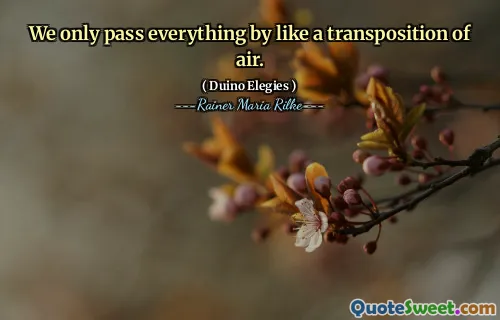Rainer Maria Rilke was a significant Austrian poet known for his profound and introspective works. Born in 1875 in Prague, he experienced a life filled with personal struggles and artistic exploration, which heavily influenced his poetry. Rilke's writing often reflects themes of existence, spirituality, and the nature of art, contemplating the human experience through an intimate lens. His notable works include "The Duino Elegies" and "Sonnets to Orpheus," which exemplify his unique style and depth of thought. Rilke's poetic style is characterized by rich imagery and philosophical inquiries, inviting readers to engage with their own emotions and thoughts. His correspondence with other artists, notably the famous sculptor Auguste Rodin, reveals his dedication to understanding the creative process. Rilke believed that true art arose from the depths of the artist's soul, and he sought to capture this essence in his writing. Despite facing challenges, including bouts of existential crises, Rilke's legacy has endured, inspiring countless poets and writers. His work encourages a contemplation of beauty and the complexities of life, offering solace to those grappling with similar feelings. Rilke passed away in 1926, but his contributions to literature remain influential to this day.
Rainer Maria Rilke was born in 1875 in Prague, where he began his journey as a poet and writer. His upbringing and experiences shaped his artistic vision, marked by a quest for meaning and understanding.
Throughout his life, Rilke engaged deeply with themes of existence, spirituality, and the essence of art. His correspondence with artists and thinkers allowed him to refine his thoughts and approach to poetry.
Rilke's works continue to resonate with modern audiences, offering insights into the human condition. He passed away in 1926, leaving behind a rich legacy that inspires and challenges readers worldwide.
More »
Today Birthdays
1970 -
Shonda Rhimes
1599 -
Edmund Spenser
1940 -
Edmund White
1957 -
Lorrie Moore
1691 -
George Fox
1961 -
Wayne Coyne
1934 -
Carolyn See
1965 -
Bill Bailey
1967 -
Masha Gessen
1937 -
George Reisman
1890 -
Elmer Davis
1978 -
Nate Silver
1884 -
Sophie Tucker
1960 -
Matthew Bourne
1980 -
Maria de Villota
1977 -
Orlando Bloom
1976 -
Michael Pena
1952 -
Geoffrey Canada
1951 -
Frank Peretti
1955 -
Trevor Rabin
1808 -
Salmon P. Chase
1947 -
Robert Martin
1927 -
Sydney Brenner
1926 -
Carolyn Gold Heilbrun
1954 -
Denise Morrison
1960 -
Eric Betzig
1968 -
Traci Bingham
1919 -
Robert Stack
1970 -
Keith Coogan
1989 -
Beau Mirchoff
